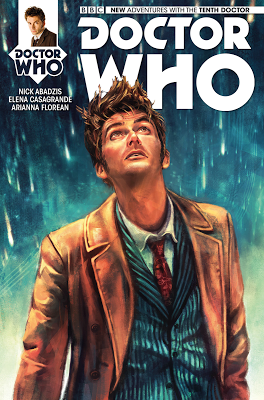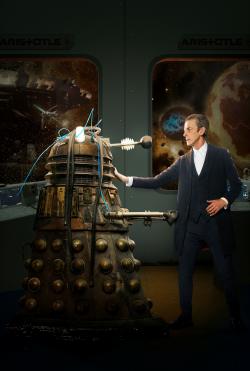
Revenge of the Swarm
Written by Jonathan Morris
Directed by Ken Bentley
Released: Aug 2014 by Big Finish
What follows is a solid but somewhat by-the-numbers story involving return visits to two prominent locations from The Invisible Enemy: Titan Base and the Bi-Al Foundation (aka the Centre for Alien Biomorphology), though at different time periods from the original television story. And just as part three of The Invisible Enemy ventured into a new, albeit derivative location, so too does part three of Revenge of the Swarm. Instead of Bob Baker and Dave Martin’s pastiche of the Sixties SF film Fantastic Voyage, however, writer and stand-in script editor Jonathan Morris references a more recent film, 1982’s Tron, in this audio adventure.
Major scenes in parts three and four of Revenge of the Swarm take place inside the Hypernet: a galaxy-connecting virtual world whose visual representation doesn’t seem to have much evolved beyond William Gibson’s 1984 novel Neuromancer, in which Gibson described cyberspace as: “A graphic representation of data abstracted from the banks of every computer in the human system. Unthinkable complexity. Lines of light ranged in the nonspace of the mind, clusters and constellations of data. Like city lights, receding.” In Revenge of the Swarm, Morris similarly and somewhat unimaginatively describes the Hypernet through the mouths of Ace and the Doctor as resembling “glowing green lines of numbers in the sky … square buildings and skyscrapers but as outlines… symbolic representations of blocks of memory”.
Morris’ predictable depiction of the Hypernet extends to his plotting as a whole; his attempt to echo the plot beats of The Invisible Enemy results in a story that is serviceable, but rarely exciting; and its appropriation of Eighties’ cultural touchstones such as Tron lack the inventive flourishes that made similar pastiches during the Holmes-Hinchcliffe years so memorable.
Performances too are sometimes lacking, particularly Olivier, who comes across as unnecessarily leaden, almost somnambulistic in the scenes where he is possessed by the Swarm (especially in comparison to Michael Sheard’s vibrant performance as a similarly-possessed Supervisor Lowe in The Invisible Enemy); even McCoy seems a little bored, rolling his R’s constantly as if trying to bring some life to the script. Thankfully John Leeson, returning after 37 years as the Nucleus of the Swarm, brings some much-needed flair to the production. Supporting characters are consistently well presented, especially Phyllida Nash as Professor Oksana Kilbraken, whose invention of a particular cloning technique plays a key role in both The Invisible Enemy and the first two episodes of this new adventure.
Given that Revenge of the Swarm is the first real adventure for this new version of Hex following his introduction in Afterlife, it’s also surprising that the story is one in which he is immediately possessed, a scenario which denies both Morris as writer, and Olivier as performer, the chance to explore more of what makes Hector unique. Nor does this plot device provide the opportunity to flesh out the changed dynamics between Hector, Ace and the Doctor. It remains to be seen whether Hector’s new personality and its ramifications for a TARDIS crew who’ve been traveling together for a decade will be more successfully explored in future audio adventures.
Another problematic aspect of the script highlights issues that current Big Finish writers face with Ace: her cultural touchstones suddenly include films outside her era, such as 1999’s The Matrix, suggesting her character has evolved in the years since Ace was last seen on television. This impression is later contradicted by her curious naiveté concerning the story’s technology (“What exactly does a neural interface helmet do,” she asks in episode three, as if its self-explanatory name would not be obvious to someone who’s travelled with the Doctor as long as Ace has) and especially by her unwavering loyalty to the Doctor, when she tells Hector in the final scenes of Revenge of the Swarm that: “The Doctor’s right; he’s always come through in the end, without fail.” Fans know that McCoy’s manipulative Seventh Doctor has let Ace down before; a conundrum that’s difficult to reconcile with earlier impressions that she’s grown as a character since 1989’s Survival.
On a positive note, the dynamic between Aldred and McCoy is as strong as ever; a scene in which Ace tells the Doctor, as he prepares to enter the Hypernet, that “You don’t think I’m letting you go in there on your own?” has the perfect mix of exasperation and camaraderie; a simple but charmingly effective summation of the well-established bond between these two iconic characters.
The Invisible Enemy memorably introduced a now much-loved new companion to Doctor Who in the form of K9, as well as heralding what was to become a progressively lighter tone to the series in subsequent seasons. It’s unlikely that this by-the-numbers Big Finish adventure will prove to be as significant, in hindsight, in another 37 years’ time.

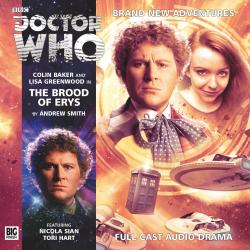
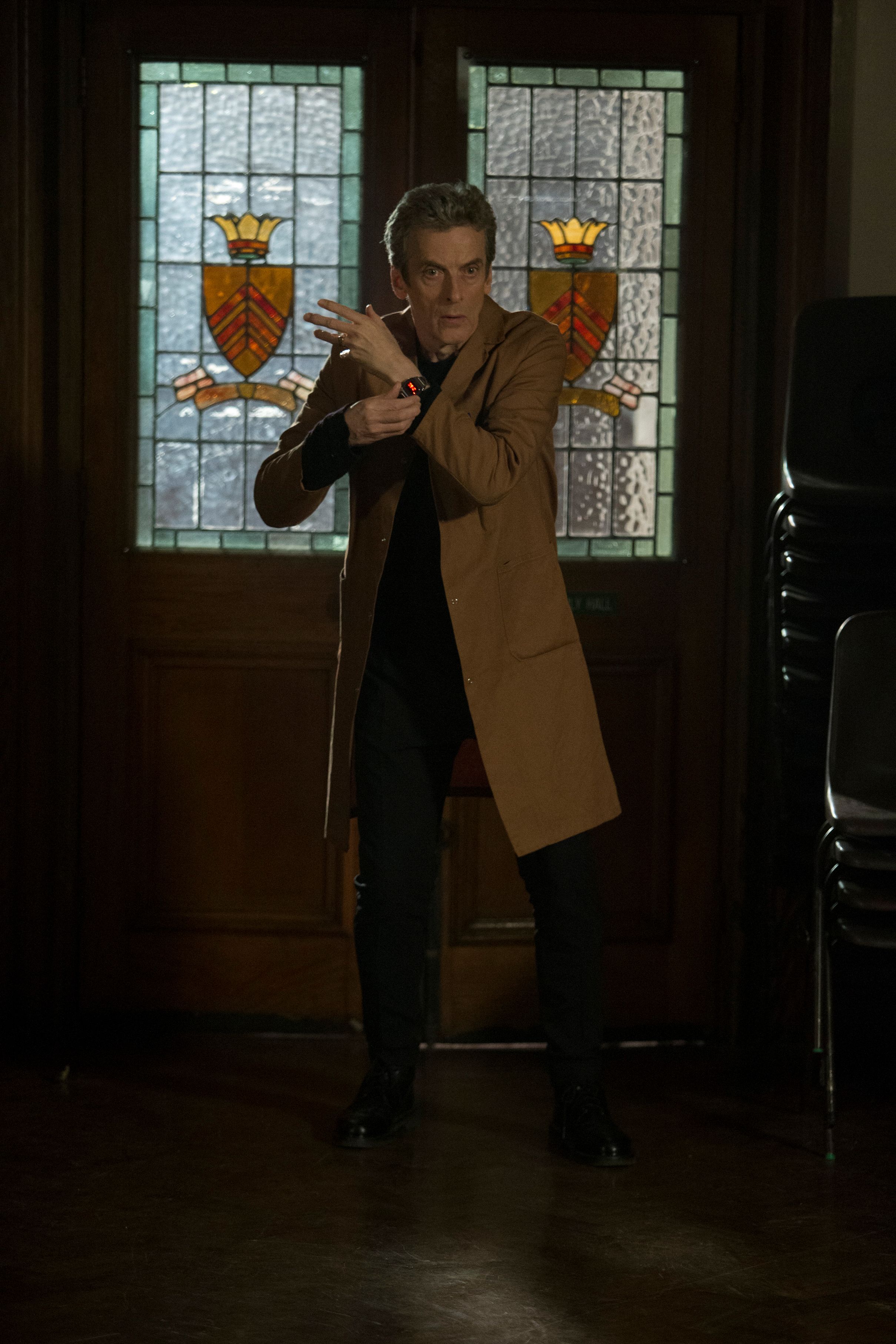

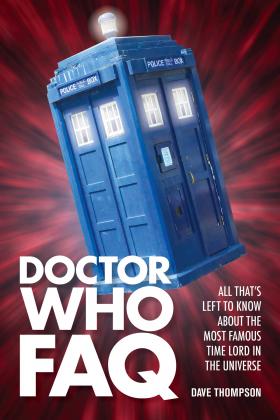
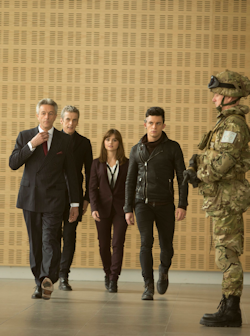
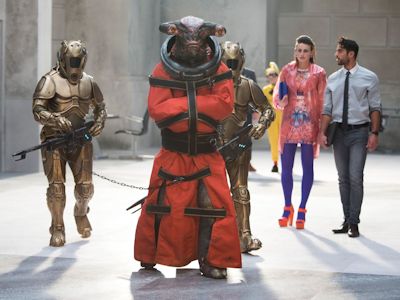 The Teller's main role as a brain eater is sufficiently scary and memorable. However there is no question that the most malicious and cruel antagonist is villainess Miss Delphox - played by Keeley Hawes (Ashes to Ashes). We are even led to have sympathy for the monster, as it is harnessed to cause damage to enemies of the Bank, by being kept in either chains or in a form of cocoon. Furthermore Delphox manipulates the Teller to dispose of a nuisance individual or two and describes the action as 'account deleted' and generally struts about the Bank giving out orders in a nonchalant way. Evidently the Doctor will have to use his keenest wits to come up with a solution against such an antagonist.. except the finale has a twist where our Time Lord icon gets help from the most unlikely of sources.
The Teller's main role as a brain eater is sufficiently scary and memorable. However there is no question that the most malicious and cruel antagonist is villainess Miss Delphox - played by Keeley Hawes (Ashes to Ashes). We are even led to have sympathy for the monster, as it is harnessed to cause damage to enemies of the Bank, by being kept in either chains or in a form of cocoon. Furthermore Delphox manipulates the Teller to dispose of a nuisance individual or two and describes the action as 'account deleted' and generally struts about the Bank giving out orders in a nonchalant way. Evidently the Doctor will have to use his keenest wits to come up with a solution against such an antagonist.. except the finale has a twist where our Time Lord icon gets help from the most unlikely of sources.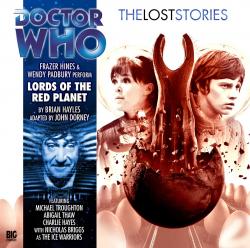
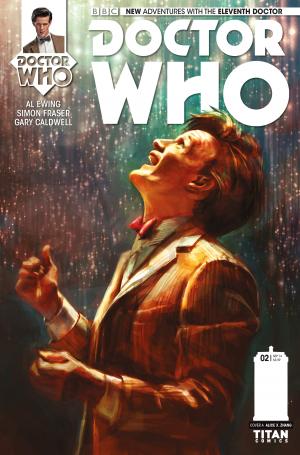
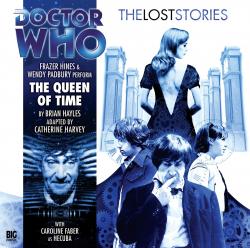
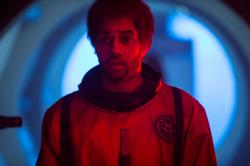
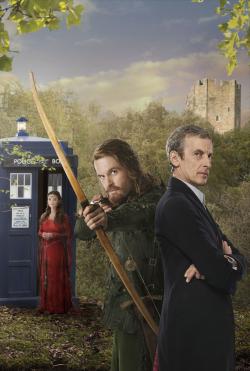
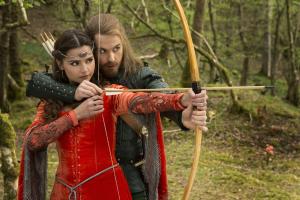
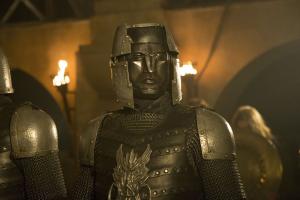 The episode has a lot of snappy elements to enjoy. One of the really funny moments involves a contest to find the best archer in land. The Doctor's marksmanship being top-notch somehow feels right for the Twelfth Doctor, and it is good to see him with a weapon other than sonic screwdriver .. for a few moments anyway. The prize of the golden arrow is tied into plot well, making this sequence not only entertaining but also key to the story. Less positively some dialogue comes off as cod-mediaeval, reminding me of '
The episode has a lot of snappy elements to enjoy. One of the really funny moments involves a contest to find the best archer in land. The Doctor's marksmanship being top-notch somehow feels right for the Twelfth Doctor, and it is good to see him with a weapon other than sonic screwdriver .. for a few moments anyway. The prize of the golden arrow is tied into plot well, making this sequence not only entertaining but also key to the story. Less positively some dialogue comes off as cod-mediaeval, reminding me of '